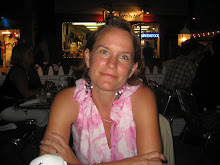




Man. Where to begin. If you want to feel ill about the life you're living in CT, have a quick look at the Charisma Hotel (5 star) in Kusadasi, Turkey's main gateway to Ephesus. If there were no Ephesus (and the dollars/euros it generates), then there might not be any measurable Kusadasi. As it is, however, cruise ships and tour buses flock here to bring Western Europeans, Americans, and the odd-out Asian groups to the truly magnificent excavations of Ephesus. There is an extensive history lesson to give here, and I heard much of it today. However, I'll leave the serious details to the wikipedia folks (ouch, did I just really say that?) Just the basics for today, seeing how far behind I am in my blogging. Ephesus was a port town, a significant trading hub in the 6-5th centuries B.C. In fact, the Amazons were from here, with one of their queens, Apessa, lending her name to the settlement. I am not fact checking, even with my own notebook, so please cut me some slack if I get some details wrong. This is the oral tradition at work. I encourage you all to pursue personal points of interest in scholarly quarters. There are scads of reputable sites devoted to Ephesus. My purpose is to recount what I saw/experienced. I think it's important to issue this kind of disclaimer--my mental notes have holes. And I'm drinking a local wine as I type this. Easy, all.
So. We are ON the Aegean. The water does not seem as swimmable as the Mediterranean. More waves, more movement below the water. Not surfing waves, just choppy. Turgid. (I think I was almost 30 before I learned that word.) Our hotel is great. Yesterday we took a boat cruise--so very sad to say goodbye to Fethiye!!--in an area whose name I did not write down. We crossed the line (demarcated by a river) from the Mediterranean coast to the Aegean. The marshy river that we followed to see the Carian (not Lycian--I was so wrong) tombs cut into the cliffs is the current expression of land change. Apparently the whole vast estuary had once been a bustling harbor but had silted up. Earthquakes (4th c. BC and others) plus other subterranean shifts. I had an AHA moment: my anthrocentric perspective was giving me a limited view on the cause/effect of human life change. The earth has its own timetable. We (or our forebears) can live as responsibly, as earth-friendly as we want, but it an earthquake or volcanic eruption hits, our way of life may be destroyed regardless of our conscientious efforts. And so it was with the area we visited yesterday (beautiful though it was) and today. We took mud baths and my skin felt so relaxed I was almost comatose. I loved having camouflage-pattern skin as I waited for all the mud to dry. A real warrior look.
Today we went to Ephesus. Too much to write now, as it's bedtime and I have a Skype date. I'll just say this: it blew my mind. I had no idea the scale, depth and importance of the site. And our guide, Ali, says that once Aphrodisias is completed (the excavation, I mean) it will surpass Ephesus as the most important archaeological site in Anatolia (one of the top in the world, no joke.) I learned so much that could inform the Western Studies course at Shepaug. Incredible. Jaw-dropping structures, mosaics, frescoes, fountains...just the sheer genius of archaeology. I never knew how totally complex, how mind-bogglingly difficult this pursuit was. I have such respect for it now. It is amazing, what they do.

love the mud bath! Liv even smiled in spite of her fever, which seems to be going down.
ReplyDelete